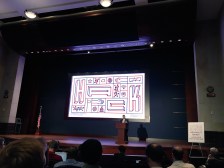3 civic hacking projects that aim to open Congress
Not only can open government be a benefit to the public — it can also help legislators do their jobs better.
That was the idea behind #Hack4Congress, a three-city hackathon held over the past three months, during which people from all walks of life came together to create projects that could be used by people working for or with House lawmakers.
Co-produced by the OpenGov Foundation and Harvard University’s Ash Center for Democratic Governance and Innovation, the winning project from each city was demoed in front of Reps. Darrell Issa, R-Calif.; Susan Brooks, R-Ind.; and Greg Walden, R-Ore., as well as a number of congressional staffers.
Seamus Kraft, the director of the OpenGov Foundation and a former staffer himself, called the projects “stunning by a number of measures.”
“I’ve been that staffer banging my head against the desk, saying, ‘No one knows what I’m doing,’ ‘No one knows what the process is,’ and ‘No one is there to help me,’ and it’s incredibly powerless,” Kraft told FedScoop. The projects “are directly relevant to real problems that add up over time which have made Congress less efficient, less effective and less user-friendly.”
Kraft wasn’t the only former staffer touting the benefits of technology Tuesday. Taylor Woods, who has held staff roles in various federal and state offices, put together a platform to facilitate more productive meetings between congressional members and citizens.
The platform, “CongressConnect,” was born out of Woods’ frustration with citizens who would come to meetings unprepared or uninformed. Through CongressConnect, constituents can not only schedule meetings, but they can access tutorials to prepare for meetings and connect with other people who share their same advocacy goals.
“It captures the essence of democracy, helping to engage, educate and empower citizens to be more active in the legislative process,” said Jessie Landerman, a public policy student at Harvard’s Kennedy School who worked on the platform.
The other two demos focused on empowering lawmakers with readily available data. CDash, a data dashboard created by a team based in San Francisco, gives congressional staffers the ability to quickly comb public data sets, explore metrics that matter to their constituents and reduce dependence on lobbyists as a source of information that influences legislation.
“We want to help members of Congress go into those meetings and have their staff fully prepared to brief them, or make the same queries and come up with their own questions in order to have conversations about ‘what do these data mean?’ so they can pay attention to what matters,” CDash project manager Katie Wing said.
Another platform, dubbed CoalitionBuilder, allows members of Congress and their staff to better track and discover which members to reach out to for collaboration on future legislation. While platforms like Politico Pro and Bloomberg Government offer this ability, they often come with a high price point that drives some advocacy shops and nongovernmental organizations away.
CoalitionBuilder tracks voting records, co-sponsorships and committee assignments using free, open data sets. It also allows users to filter by party, caucus or committee, and it plans to add floor speeches, co-sponsorships to the filter list.
Prior to the demos, Issa called the event “critical” to helping lawmakers and the American public figure out what’s going on in the country and how they can better influence legislation.
“The difference between our founding fathers and today is there is so much more information and it’s so hard to even sort through the information the executive and legislative branch wants you to see,” Issa said. “The goal is for the American people, for 300 million-plus people, to begin discovering, and then telling us what they see that was overlooked by the handful of people who run the government today.”
Kraft said the hackathons show that a notable transformation is happening in the House and is catching on in other parts of Capitol Hill.
“Four years ago when I was here, something like this never could have happened. To get to the point where we are now means we are making measurable progress,” Kraft told FedScoop. “The next big step is ‘porting the awesome’ that we’ve seen on the House side. The big interest has been from the Senate side, because they know they are next and they know they have a lot of work to do.”





